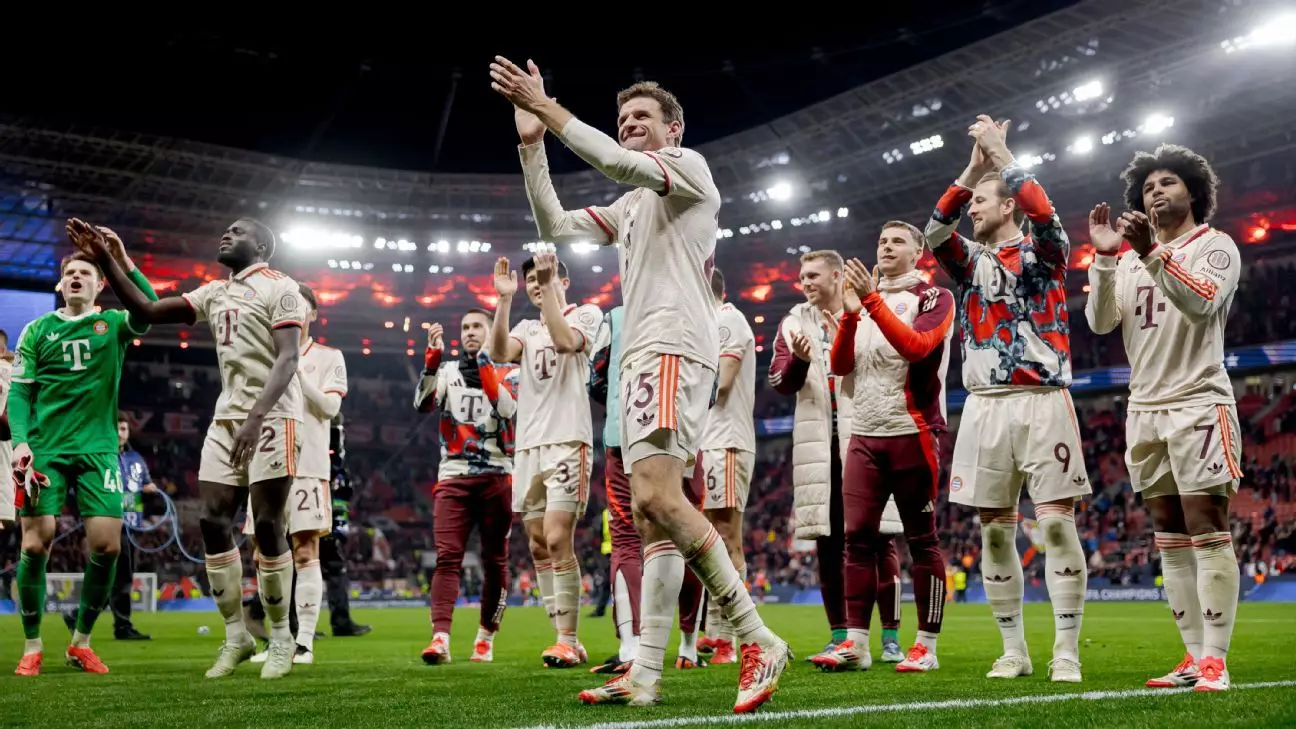Bayern Munich’s journey through the 2024-25 season has been a study in contrasts, capturing the attention of football fans and pundits alike. At the heart of this narrative is the paradox of a team that, despite myriad inconsistencies, sits on the brink of achieving the elusive Bundesliga and UEFA Champions League double. With an eight-point lead in the Bundesliga and a quarterfinal berth in the Champions League, one might naively unearth a narrative of a synchronously thriving club. However, a deeper examination reveals a side entangled in uncertainty and an air of impermanence, casting shadows over their ostensible successes.
The club, known for its enduring dominance in German football, has exhibited stretches of chaotic play throughout the season. While conventional wisdom would posit that such a point total reflects robust performances, this isn’t entirely the case for Bayern. Their current placement owes as much to their own output as to the shortcomings of rival teams. This year’s Bundesliga has been defined less by unparalleled excellence from Bayern and more by a lack of formidable competition, especially given the struggles of Borussia Dortmund and other traditional contenders.
Beneath the Surface: The Kompany Conundrum
Vincent Kompany’s appointment as head coach was steeped in controversy. The club’s pursuit of high-profile managers like Zinedine Zidane and Ralf Rangnick resulted in a series of embarrassing rejections that left many alarm bells ringing across Bavarian football. Fans were perhaps all too prepared to analyze Kompany’s past, focusing on his solitary season managing Burnley—where relegation marred his debut—instead of his potential as a tactician. This skepticism raises a critical question: is Kompany capable of turning around a behemoth like Bayern when he may not be equipped with the resume that typically inspires confidence?
Despite this, there is a subtle resilience lurking within the ranks. Players such as Harry Kane have stepped into crucial roles with impactful performances that, at times, overshadow the underwhelming aspects of their team’s play. Kane’s affinity for scoring, especially when paired with the raw talent of youngsters like Jamal Musiala, serves as a reminder that even amid unfavorable circumstances, glimmers of brilliance can catalyze success. Yet, this scenario cannot distract from the broader truth of Bayern’s fluctuating form—a diminished squad cohesiveness has often left fans grasping for a more reliable product on the pitch.
Unsettled Foundations: Contractual Chaos and Injuries
The landscape of Bayern’s squad has not been without turmoil. The pre-season transfer dealings raised eyebrows, particularly the acquisition of players who spent significant time on the injury list, like Joäo Palhinha. Moreover, the protracted contract negotiations for club stalwarts like Joshua Kimmich and Alphonso Davies added layers of uncertainty to an already tense atmosphere. The cloud of ambiguity regarding players’ futures injects instability that can reverberate throughout the squad, challenging team morale at critical junctures.
Furthermore, Bayern’s reliance on recycled players to plug key roles brings about questions regarding their long-term vision. The strategy of operating with a make-shift lineup—most notably seen with their midfield duos and shaky defense—has fed into the narrative of an incomplete project. As they prepare to face formidable opponents like Inter Milan, questions arise: can they defy expectations and advance against teams exhibiting clearer tactical coherence?
A Cautionary Tale of Standards and Expectations
One cannot discuss Bayern Munich without touching upon the club’s sky-high standards. The expectation to win every match with devastating ease crafts an atmosphere where anything less is met with palpable frustration. Even a victory can feel hollow when it emerges from unspectacular performances. The sense of urgency surrounding Kompany is palpable, as it reflects an unsettling dynamic where good enough can often feel underwhelming. Fans and management alike perpetuate this breeding ground of scrutiny, where each misstep receives magnified attention—a double-edged sword in the quest for success.
In the broader spectrum of European football, one must consider whether Bayern’s continual advancements in the Champions League are symptomatic of situational luck or a testament to the club’s philosophical approach that continues to separate them from others. While competitions like the Bundesliga may highlight vulnerabilities, the Champions League offers an unpredictable stage where pure talent and tactical ingenuity often play pivotal roles.
Ultimately, the narrative surrounding Bayern Munich as they teeter on the brink of a historic double teeters precariously between celebration and criticism. As they move into the latter stages of the season, the questions surrounding their capability, consistency, and tactical wisdom are essential not only for their current standing but will be fundamental in shaping their future identity on the grand stage of football.

